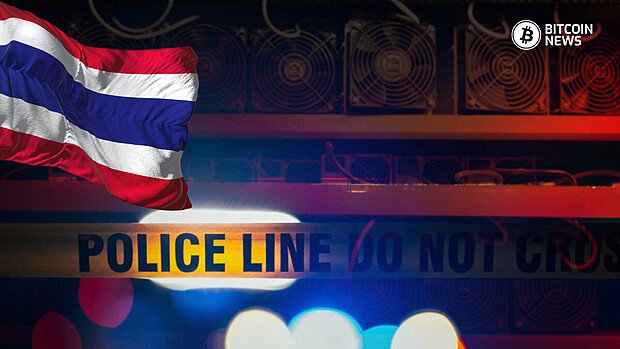In a quiet town west of Bangkok, a significant illegal Bitcoin mining operation has been uncovered by Thai authorities. This discovery came after over a month of power outages that left residents in Ratchaburi puzzled and frustrated.
The raid, conducted on August 23, has shed light on the growing problem of illegal Bitcoin mining in Thailand and Southeast Asia, where operators exploit the region’s relatively low electricity costs to power their high-energy-consuming activities.
The story begins in mid-July, when residents of Ratchaburi started experiencing unusual and frequent blackouts. These power outages, which affected both homes and businesses, became a regular occurrence, disrupting daily life in the community.
Concerned and frustrated, the residents reported the issue to local authorities, prompting an investigation by the Provincial Electricity Authority (PEA) in collaboration with local police.
The investigation soon revealed that the blackouts were not due to a typical technical fault or an increase in local electricity demand.
Instead, they were traced back to a single house in the area. This house, it turned out, was the center of a large-scale Bitcoin mining operation, illegally siphoning off electricity to power its mining rigs.
On August 23, authorities, armed with a search warrant, raided the house in Ratchaburi. What they found was a sophisticated Bitcoin mining farm consuming large amounts of electricity.
Jamnong Chanwong, the chief district security officer, was one of the officials present during the raid. He reported that the electricity consumption at the property was abnormally high, yet the payments made for this electricity were suspiciously low. Chanwong said:
“We found Bitcoin mining rigs, pointing to people using this house to operate a mine and using power they didn’t fully pay for.”
The house had been rented by a company for about four months, and it was during this period that the blackouts began to plague the area.
The authorities’ first attempt to enter the house was met with resistance. According to reports, a guard stationed at the house denied them entry.
However, the officials were undeterred. They returned the next day with a proper search warrant, only to find that most of the mining equipment had been moved, likely in a bid to evade the law.
This wasn’t the first time Ratchaburi had been the site of such an operation. In fact, this raid marked the fourth time in 2024 that authorities had uncovered illegal Bitcoin mining activities in the province.
The repeated incidents point to a growing trend of illegal mining operations in Thailand, where Bitcoin miners, classified as manufacturers, are required to pay taxes.
However, many opt to avoid these legal obligations, operating under the radar and stealing electricity to maximize their profits.
Illegal Bitcoin mining is not just a problem in Thailand but across Southeast Asia.
Operators are drawn to the region due to its relatively low electricity costs, which allow them to run their mining rigs more cheaply than in other parts of the world. However, these illegal operations come at a significant cost to local communities and power providers.
In Thailand, the impact of these activities is becoming increasingly apparent. The illegal miners’ theft of electricity leads to higher costs for legitimate consumers, who ultimately bear the burden of the increased demand on the power grid.
Moreover, the frequent blackouts caused by these operations disrupt daily life and can have severe consequences for both residential and commercial power users.
This power theft not only strains the local power grid but also raises questions about the effectiveness of current regulations in curbing such activities.
Jamnong Chanwong expressed his concern about the sustainability of the local power supply in the face of such illegal activities.
The Thai government has been relatively supportive of Bitcoin compared to some of its regional counterparts. The country has introduced regulations designed to foster innovation in the digital asset sector while protecting investors.
For instance, the Thai Securities and Exchange Commission recently eased restrictions on retail investors, allowing them to purchase digital tokens backed by real estate or infrastructure projects.
This move was part of a broader effort to encourage the growth of the digital economy in Thailand.
Related: Thailand’s Regulator Approves First Bitcoin ETF
However, the rise in illegal Bitcoin mining operations suggests that more needs to be done to regulate the industry effectively.
While the government has implemented measures to control the legal aspects of bitcoin trading and investment, the rapid development of the sector has outpaced regulatory efforts in some areas, particularly in monitoring and preventing illegal mining activities.
In response to the growing problem, authorities in Thailand and other Southeast Asian countries are stepping up their efforts to crack down on illegal mining operations.
For example, in Malaysia, authorities have confiscated and destroyed over $1.2 million worth of illegal Bitcoin mining rigs as part of a broader effort to combat electricity theft. Similar measures may be needed in Thailand to deter operators from engaging in illegal activities.
The discovery of the illegal mining operation in Ratchaburi highlights the need for stricter enforcement and better monitoring of the Bitcoin mining industry in Thailand.
While the government’s efforts to promote the sector are commendable, they must be balanced with measures to ensure that illegal activities do not undermine the country’s energy security and economic stability.













